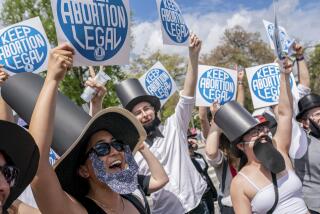Arab-Americans Split on View of Crisis in Gulf : Communities: The 2.5 million Americans of Arabic descent also disagree on the U.S. presence in the region. Many fear discrimination.
- Share via
WASHINGTON — When James Zogby called fellow Arab-Americans across the country to arrange an emergency meeting today on the Middle East crisis, he realized how difficult it will be to fashion a unified response: One Arab community leader in Ohio had to back out because he had just been called up for active duty with the Naval Reserves.
“He’s an American doing his duty, so it’s not difficult for him,” said Zogby, executive director of the Washington-based Arab-American Institute.
Nonetheless, he said, the incident underscores the diversity within the Arab-American community and the problems it faces in attempting to arrive at a consensus on the crisis.
“We are not one group with one voice,” Zogby said.
Indeed, the reaction to Iraq’s invasion of Kuwait among the 2.5 million Americans of Arabic descent has been just as troubled and varied as the response within the Middle East itself.
“Our community reaction is certainly not uniform,” said Khalil Jahshan, associate executive director of the National Assn. of Arab Americans in Washington.
At the same time, many Arabs here are increasingly concerned that a prolonged crisis will lead to discrimination against Arab-Americans--even though many are just as strongly opposed to Iraq’s invasion of Kuwait as other Americans.
While there have been scattered reports of obscene phone calls placed to the offices of Arab organizations since the invasion, most Arab-American leaders report little hard evidence of widespread public resentment toward them.
“There have been very few incidents of harassment so far, but if this crisis escalates, it could get bad,” said Michael Sarafa, an Iraqi-American community activist in Michigan.
“We get blamed for the problems of that part of the world,” said Salam al-Marayati, director of the Muslim Public Affairs Council in Los Angeles. “That puts us in an uncomfortable position.”
Nowhere is the Arab-American attitudinal split more evident than among the 250,000 Iraqi-Americans. While some support President Saddam Hussein’s view that Iraq has historic claims on Kuwait, others endorse the deployment of U.S. troops to the Middle East.
“We think this is just a conflict between Iraq and Kuwait, and it should have been resolved by the Arabs themselves without American troops,” argued Salim Mansour, a Virginia physician and president of the American-Iraqi Foundation. The group was just founded in July and was in the midst of its first membership drive when the crisis began.
“Now we’ve got an American armada, with Stealth (fighters) and everything, going against a tiny country,” complained Mansour.
Hatem Shaaban, a professor at the Arabic and Islamic University in Los Angeles, said many Arab-Americans believe that what “Hussein did was of necessity, especially since Kuwait was once part of Iraq.”
For the most part, however, Arab-American leaders have publicly condemned Iraq’s invasion and supported the imposition of international sanctions against Hussein’s regime.
Arabs here are far more divided, though, over the deployment of U.S. troops to Saudi Arabia. Many warn that Arab resentment over American support for Israel will spill over into anger and opposition to U.S. involvement in the Gulf region.
They also argue that many Arab-Americans see a double standard in American foreign policy, with swift action against Iraq’s invasion of Kuwait contrasting sharply in their minds with U.S. acquiescence to Israel’s occupation of the West Bank.
In fact, many community leaders say Iraqi President Hussein’s peace proposal, which linked an Iraqi pull-out from Kuwait to an Israeli withdrawal from its occupied territories, has found a receptive audience among Arabs here. The proposal was rejected by the Bush Administration.
“Saddam has no moral authority to raise the issue of a Palestinian homeland, but if we don’t join that battle, we undermine our credibility,” said Zogby.
The demographics of the Arab community in the United States clearly influence its attitudes. Fewer than 1% of Arab-Americans are from the rich Persian Gulf states. The vast majority are natives of the poorest Arab regions. As a result, there is relatively little sympathy for the Saudis and Kuwaitis.
The majority of Arabs here are either Lebanese, Syrian or Palestinian, and they identify more closely with Iraq’s relative austerity than with Kuwait’s opulence.
“There is a resentment in the Middle East among the have-nots towards the haves, and that resentment has spilled over into the Arab-American community,” said Jahshan of the National Assn. of Arab Americans.
Despite the efforts of people like Zogby, it has been impossible to develop an Arab-American consensus.
The American Arab Anti-Discrimination Committee has become the first major Arab group to publicly oppose Bush Administration military policies in the Gulf.
“I would say that 90% of Arabs in this country are condemning Iraq’s move into Kuwait, but 90% are also opposed to the unilateral deployment of American troops,” said Abdeen Jabara, president of the anti-discrimination group. “President Bush’s decision is wrong.”
But other Arab organizations have reluctantly supported an American military presence in the region.
“We support the defense of Saudi Arabia,” said Zogby. “For us, it is a matter of credibility. We have based our arguments against Israel’s occupation on the inadmissibility of the acquisition of territory by force, and so we must now be consistent.”
Times staff writer Tracy Wilkinson, in Los Angeles, contributed to this report.
More to Read
Sign up for Essential California
The most important California stories and recommendations in your inbox every morning.
You may occasionally receive promotional content from the Los Angeles Times.










